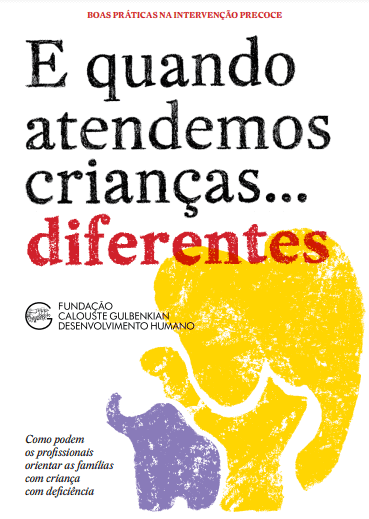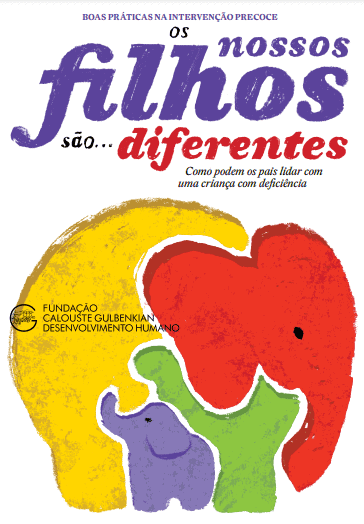From 2005 to 2009, a collaborative project involving families, professionals, and diverse partners from the community (e.g., Fundação Calouste Gulbenkian, charity organizations, a municipality) aimed to identify and to study how to construct good practices in Early Childhood Intervention (ECI). The project resulted in the development of materials(1) to support families of children with disabilities, and professionals working in the field of ECI.

Early Childhood Intervention: A shared framework
The project was developed based on a framework proposed by the European Agency for Development in Special Needs Education, which resulted from the combined efforts of 26 European countries, and has been published in diverse languages.
According to this framework, ECI is a “composite of services/provision for very young children and their families, provided at their request at a certain time in a child’s life, covering any action undertaken when a child needs special support to: (a) ensure and enhance her/his personal development, (b) strengthen the family’s own competences, and (c) promote the social inclusion of the family and the child. These actions are to be provided in the child’s natural setting, preferably at a local level, with a family-oriented and multidimensional teamwork approach”.
Identification and construction of good practices
I noticed something on Doctor’s face, but he told me everything was fine. He called other doctors, then another doctor, they talked, and afterwards they took my daughter L. with them. I asked what was going on, what was the matter with L., and Doctor said: “Oh it’s just a few problems”. The suspicion was that L. could have some problems with her shoulders – “You can’t see the shoulders, the neck, but we are not sure”. After several doctors have seen L., none of them told me what it was, concretely. They just told me that she must have some problems and if I knew anything. Then Doctor M. asked me about my pregnancy: if someone said anything to me and if my pregnancy was normal. I told him everything was normal. Then he told me that my girl really had problems, that he didn’t know exactly what it was, but more exams were needed.
Adapted from a testimonial of a parent
Society should be prepared to give all the help our children need. But it doesn’t happen like that, it’s us who have to look for places and people who can help … We do everything ourselves.
Adapted from a testimonial of a parent
Informing parents that the baby has a disease that generates serious developmental disorder, namely a cognitive disability is one of the most difficult tasks that are committed to health professionals, particularly to pediatricians.
Adapted from a testimonial of a pediatrician
Based on families and professionals’ experiences, the project aimed to develop resources that could inform about good practices. Generally, three fundamental practices to support families and professionals were identified:
- Families’ participation in all the process (i.e., from the assessment and evaluation, to the intervention planning and the intervention itself)
- Collaborative relationships and partnership between professionals (i.e., teamwork) and caregivers (e.g., sharing information, strategies, and resources, which brings benefits for all intervenients)
- Assessment and intervention focused on the child’s natural learning contexts and daily routines (e.g., home, kindergarten, etc.)
The main goal of this project was to support and empower parents and professionals, while simultaneously conveying a message of confidence and optimism towards the quality of life and wellbeing of their children.
Negative things can have two effects. Either we get disgusted and do not move forward, staying in an eternal state of anger and dissatisfaction, or it can be used in a constructive way… I am optimistic… Some days I can feel down, but I can also move forward… J’s birth was a turning point in my way of seeing things and helping others… It causes suffering for us and for her, but that’s also what makes me move forward. I don’t want changes just for the benefit of J… What we achieve will definitely help all the others.
Adapted from a testimonial of a parent
What are your perspectives on the above-mentioned practices? Please share your reflections and experiences with us!
(1)Authors of the materials: Joaquim Gronita, Júlia Serpa Pimentel, Ana Cristina Bernardo, Cátia Matos, Joana Duarte Marques
